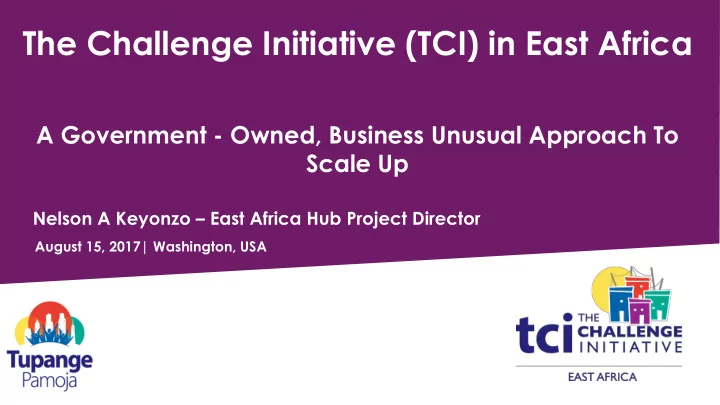

The Challenge Initiative (TCI) in East Africa OUR COMPANY A Government - Owned, Business Unusual Approach To Scale Up Nelson A Keyonzo – East Africa Hub Project Director August 15, 2017| Washington, USA
Taking proven Tupange • innovations to more geographies in East Africa in a participatory way, emphasizing country- leadership for sustainability Using a systematic and • phased approach to scale up 2 The Challenge Initiative
Stage 1: Marketing & advocacy to introduce the TCI concept and garner interest • Initial Marketing Meeting to 27 Counties • Expression of interest and letters of commitment • One on one visits and joint meetings with county health managers • County health & TCI team meetings to plan for landscaping and proposal development • Communicating to counties not prioritized in year 1 and keeping them “warm” for future implementation 3 The Challenge Initiative The Challenge Initiative
Stage 2: Landscaping and proposal development • Review of Tupange interventions • Landscaping at the geography level to identify FP gaps/needs within counties: • Landscaping analysis and validation of information • Gap identification • Setting of FP priorities • Pre-award assessment • Initiation of discussion on county engagement mechanisms 4 The Challenge Initiative
TCI Landscaping: Discussing the approach with community health workers 5 The Challenge Initiative
Stage 3: Implementation • Discuss and agree on implementation mechanisms • Memorandum of understanding (MoU) • Fixed amount award mechanisms for funding flows • Technical assistance/coaching plans • Initiate implementation plan • Impact of elections and electoral change 6 The Challenge Initiative
Change in mindsets required at two levels: TCI East Africa Hub team shifts from a proactive to a facilitative mentoring/coaching role Counties actively leading and owning implementation Continuously reexamining the resource team 7 The Challenge Initiative
Challenges • How to deal with government bureaucracies in financial accountability and transparency that will have an impact on financial reporting • Multiple administrative structures in a devolved system • Shifting to a more demand driven, mentoring and facilitative approach takes time 8 The Challenge Initiative
Key learnings about moving towards sustainable scale up • Participatory process key to securing government ownership • Due to weak county capacity, high level of mentoring/coaching in proposal-writing and implementation are needed • Reaching consensus on guiding principles and implementation mechanisms at the outset is essential 9 The Challenge Initiative
Key learnings (continued) • The concept of self-selection can be “ risky “ and requires a balanced approach • It is not easy to scale up rapidly in new localities with a lean and mean team, with less resources and the business unusual approach • Having continuity in the team to guide scale up is critical; however, they must shift their mindsets to the new scale up-focused approach 10 The Challenge Initiative
Conclusion : Rapid scale up might not be as rapid as we would like it to be, but government ownership will have been established, which is key to sustainable scale up 11 The Challenge Initiative
Government ownership “This is different from the past. What we do will not belong to the donor. Now we are together, creating opportunities for the community to have access, not just now but in the future.” ~ Dr. Betty Langat, County Director of Health, Kericho County, during landscaping opening meeting The Challenge Initiative 12
Recommend
More recommend